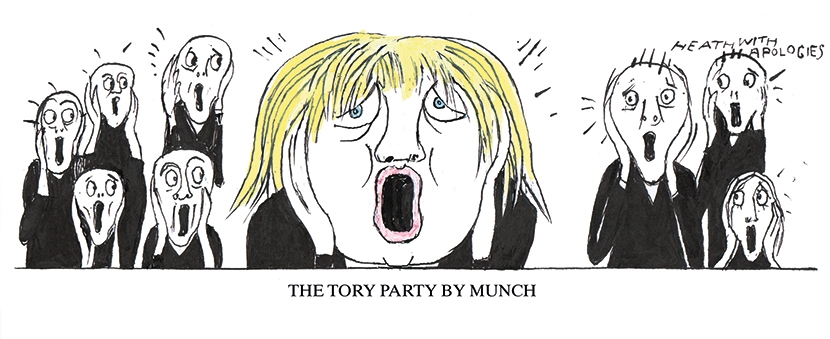Home
At one minute past midnight on Monday, new laws came into force prohibiting households in England increasing their numbers to more than six either at home or in the open air, not passed by parliament but imposed by statutory instrument by the Home Secretary under the Public Health Act 1984. The laws had been given the name ‘Rule of Six’ by Boris Johnson, the Prime Minister. Mingling was singled out for censure. Wales and Scotland had their own variants, principally exempting children from the count. People in Birmingham, Sandwell and Solihull were banned from meeting anyone not part of their household; parents complained that this prevented grandparents looking after their children. At the beginning of the week, Sunday 6 September, total deaths within 28 days of testing positive for the coronavirus had stood at 41,623 — 74 more than a week earlier. Of the 8,996 deaths from any cause registered in the week ending 4 September, 83 mentioned Covid-19 on the death certificate — the lowest figure since 13 March. The Royal College of Psychiatrists estimated that 8.4 million people were drinking hazardous levels of alcohol, compared with 4.8 million in February.
The government wallowed in heavy weather of its own making after introducing the Internal Market Bill, which would ‘break international law in a very specific and limited way’, according to Brandon Lewis, the Northern Ireland Secretary. Its ostensible purpose was to prevent tariffs and customs restrictions being placed on trade between Northern Ireland and the rest of the United Kingdom, in the event of no agreement having been made with the European Union. At second reading, it received a majority of 77, with two Tory MPs voting against it and 30 abstaining. Sir Keir Starmer, the Labour leader, was absent from parliament, self-isolating at home. Britain signed a trade agreement with Japan. Leighton Buzzard suffered its second small earthquake in a week.
Many people, including doctors and teachers, found it impossible to get a test for coronavirus, preventing their return to work. About 200,000 tests a day seemed to be carried out. ‘I think that we will be able to solve this problem in a matter of weeks,’ Matt Hancock, the Health Secretary told the Commons. On one day, 319 migrants crossed the Channel in small boats, and on another 168, bringing the total for the year to more than 6,100. Sir Terence Conran, the designer who opened his first Habitat shop in 1964, died aged 88.
Abroad
The total number in the world who had died with coronavirus reached 928,070 by the beginning of the week; a week earlier it had been 883,643. India had seen more than 80,000 deaths and Mexico more than 70,000. The death rate in Peru approached one in a thousand. Israel imposed a new national lockdown. Dr Zweli Mkhize, the health minister of South Africa, said there was evidence that 12 million, 20 per cent of the population, had had Covid-19, though only 650,749 had been detected in tests. Toots Hibbert, the Jamaican reggae musician, died aged 77, from complications of Covid. The whole Irish cabinet self-isolated for the afternoon when the health minister said he felt unwell, but it turned out to be something else.
In Minsk, 100,000 people again took to the street, demonstrating against the rigging of elections on 9 August; police said 400 had been detained. Alexei Navalny, the Russian opposition figure poisoned in Siberia, was able to breathe without a ventilator in hospital in Berlin and was said to wish to return to Russia. Protesters set fire to the Benghazi headquarters of the government supported by General Khalifa Haftar, which lays claim to the rule of Libya. About 800 migrants of 12,000 who fled a fire that destroyed their camp at Moria, on Lesbos, moved to a new camp. Greek police arrested five migrants over the fire; some migrants blamed local people. Four people were jailed in Vietnam for their roles in the death of 39 migrants found in a lorry in Essex last year. Arm Holdings, the British-based computer chip designer bought four years ago by the Japanese conglomerate Softbank for $32 billion, was sold to the American company Nvidia for $40 billion.
Peace talks between Afghan leaders and the Taleban began in Qatar. Israel signed agreements at the White House in Washington normalising relations with the UAE and with Bahrain. Wildfires raged in Oregon, California and Washington State, destroying five million acres and thousands of houses. CSH






Comments